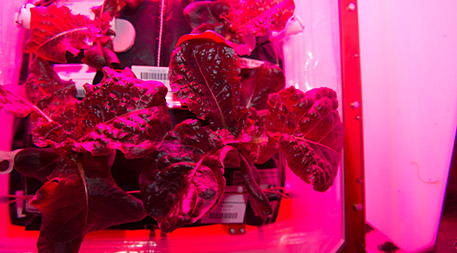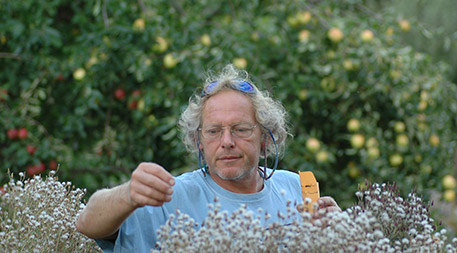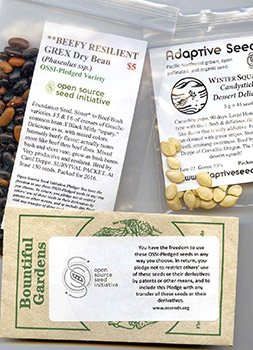How “Open Source” Seed Producers Are Changing Global Food Production
Page 1 of 1
 How “Open Source” Seed Producers Are Changing Global Food Production
How “Open Source” Seed Producers Are Changing Global Food Production
How “Open Source” Seed Producers Are Changing Global Food Production

Friday. 16 December 2016

Around the world, plant breeders are resisting what they see as corporate control of the food supply by making seeds available for other breeders to use.
By Rachel CernanskyFrank Morton has been breeding lettuce since the 1980s. His company offers 114 varieties, among them Outredgeous, which last year became the first plant that NASA astronauts grew and ate in space. For nearly 20 years, Morton’s work was limited only by his imagination and by how many different kinds of lettuce he could get his hands on. But in the early 2000s, he started noticing more and more lettuces were patented, meaning he would not be able to use them for breeding. The patents weren’t just for different types of lettuce, but specific traits such as resistance to a disease, a particular shade of red or green, or curliness of the leaf. Such patents have increased in the years since, and are encroaching on a growing range of crops, from corn to carrots — a trend that has plant breeders, environmentalists and food security experts concerned about the future of the food production.
A determined fellow dedicated to the millennia-old tradition of plant breeding, Morton still breeds lettuce — it just takes longer, because more restrictions make it harder for him to do his work.
“It’s just a rock in the river and I’m floating around it. That’s basically what we have to do, but it breaks the breeding tradition,” he says. “I think these lettuce patents are overreaching and if they [were to hold up in court], nobody can breed a new lettuce anymore because all the traits have been claimed.” He continues to work with what is available, breeding for traits he desires while being extra careful to avoid any material restricted by intellectual property rights. He has also joined a movement that is growing in the U.S. and around the world: “open source” breeding.

Astronauts on the International Space Station grew and ate Outredgeous red romaine lettuce in the station’s “Veggie” system, a test kitchen for growing plants in space. Photo by NASA
If the term sounds like it belongs in the tech world more than in plant breeding, that’s no accident. The Open Source Seed Initiative, inspired by “the free and open source software movement that has provided alternatives to proprietary software,” was created to ensure that some plant varieties and genes will remain free from intellectual property rights and available for plant breeders in perpetuity. As part of the initiative, commonly known as OSSI, U.S. breeders can take a pledge that commits the seeds they produce to remain available for others to use for breeding in the future.That doesn’t mean they can’t build a business with or sell them. What the pledge does is allow farmers who buy seeds from an open-source breeder to cross them with other material to breed their own varieties and save them for future seasons — two things many crop patents forbid. Dozens of breeders and seed companies have committed to OSSI since the initiative’s launch in 2014.
Compromised Future
For University of Wisconsin–Madison professor emeritus and OSSI board member Jack Kloppenburg, control of seeds and the ability to breed new crops are matters of both food security and environmental protection. Seeds play a role in larger issues like biodiversity, farmers’ rights, control of the food system and use of agricultural chemicals, which many independent breeders try to avoid or reduce by breeding natural resistance into crops themselves.Kloppenburg emphasizes that the open-source movement is not about genetically modified organisms; patents can affect all crops, vegetable or grain, GMO or conventional, organic or not. “Control over the seed is what’s at the core of all environmental sustainability that we’re working toward,” he says, pointing to the increased consolidation in the global agriculture industry, most recently with the mergers announced between ChemChina and Syngenta in August 2016, and Monsanto and Bayer in September. “If you go to the farmer’s market and you’re interested in buying good, local, sustainably produced vegetables, you also need to understand that most vegetables are coming out of a breeding process that is itself endangered. We will not have food sovereignty until we have seed sovereignty.”
The Open Source Seed Initiative, where U.S. breeders take a pledge committing their seeds to remain available for others to use for breeding in the future, is in contrast to the practice of patenting seeds and crop traits. Photo by Jack Kloppenburg
OSSI supporters argue that as planting material becomes more restricted through intellectual property rights, the future of the food supply is compromised because the gene pool is continually shrinking. OSSI executive director Claire Luby, whose Ph.D. thesis focused on genetic variation and availability within carrots, found that about one-third of all carrot material has been protected by intellectual property rights, rendering it unavailable or difficult for plant breeders to use. Similar estimates do not yet exist for other crops, but experts such as Luby are confidentthat big commodity crops such as corn are even more heavily impacted than crops such as lettuce and carrots.A Matter of Perspective
Growers breed plants to selectively express desirable traits — from those that will improve a crop’s taste or color, to those that help crops thrive in certain environments and resist threats such as pests or disease. Opponents of crop-trait patents say the increase in patents is shrinking the catalog of plant material available to breeders at a time when the need for genetic diversity is greater than ever, thanks to the less-predictable conditions brought on by climate change.In an email, Monsanto spokesperson Carly Scaduto recognized the importance of genetic diversity, saying it’s crucial for the company’s operations and Monsanto works to preserve diversity through its four gene banks and by collaborating with institutions around the world, including the U.S. Department of Agriculture. But she disagreed with the notion that intellectual property suppresses other breeding efforts. “Patents and [plant variety protection] inspire innovation,” she wrote.“Basically, the patent creates a map to allow anyone else to do the same once the patent expires. Oftentimes those ‘how to’ instructions enable others to accomplish the same result by finding another method to get there. So rather than hindering innovation, such protection facilitates it by placing more material and know-how in the public domain.”
Morton, however, argues waiting the 20 years for a patent to expire is no way to encourage innovation, and waiting that long to breed crops that can adapt to changing conditions is a losing battle. Even that misses the main point for Morton, though: genetic resources have always belonged to the commons, and should continue to be a public good, he says. “[Independent plant breeders] have neither the time nor money for such formalities, and monetary incentives are not what move us. We want to improve farming for farmers. That’s a different motivator, not promoted by stifling the free use of the best and newest genetic resources.”
 Independent plant breeder Frank Morton selects lettuce seed in his breeding nursery. Photo by Karen Morton
Independent plant breeder Frank Morton selects lettuce seed in his breeding nursery. Photo by Karen MortonFor Carol Deppe, an Oregon plant breeder and OSSI board member, there’s another component to breeding that’s important. “When you breed a variety, you breed your own values right into the variety,” she says. “If you believe in huge agribusiness farms with monocultures that are managed with massive doses of herbicides, then you breed your concept of what agriculture should be like into that variety. I do exactly the opposite.”
While a handful of medium-sized companies (those with international markets but smaller than, say, Monsanto) hold patents, most smaller seed companies are able to survive without patenting — they either are opposed to the practice, have decided the process is too costly to be worthwhile, or both.
Morton argues that avoiding intellectual property protection also encourages more active breeding. “Seems to me that my incentive to crank out new stuff is stronger than [companies that patent]. I need new stuff constantly to feed my catalog with new material, knowing that my competitors will be selling my varieties within a few years,” he says. “A patent creates a 20-year insulation against competitive intrusion, which seems pretty cushy from my perspective.”
Global Response
While the U.S. seems to be leading the open-source charge, the concept is rapidly spreading around the world. In India, the Centre for Sustainable Agriculture, which describes itself as a professional resource organization, runs an open-source seed program, working with farmers to preserve seeds for traditional food varieties and to involve them in breeding new varieties that meet specific needs...Read more: Ensia
Thanks to: http://www.earth-heal.com
Guest- Guest
 Similar topics
Similar topics» Grow Flowers and Food Everywhere You Go With DIY Seed Bombs
» Heirloom Seed Companies
» How To Grow Avocados From Seed The Fastest Way
» Black Seed Oil Cures Many Cancers According to Numerous Studies
» Historic milestone: renewables now largest source of installed power in the world
» Heirloom Seed Companies
» How To Grow Avocados From Seed The Fastest Way
» Black Seed Oil Cures Many Cancers According to Numerous Studies
» Historic milestone: renewables now largest source of installed power in the world
Page 1 of 1
Permissions in this forum:
You cannot reply to topics in this forum


» Crypto Price Crash: As Bitcoin And Ethereum Collapse, Elon Musk Brands Radical Dogecoin Plan A ‘Great Idea’
» Co-Impact Sourcing - Rose
» Co-Impact Sourcing - Lemon
» Doterra's Co-Impact Sourcing, The Doterra Difference
» How to Build a Firepit
» How To Make Bar Soap Yourself
» How to Grow Blueberries
» Bring On the Cheer
» Natural Homemade Plant Fungicide Works A Treat
» The Best Lemon Impossible Pie Recipe
» How To Make A Rainbow Unicorn Cheesecake
» How To Tint Jars And Bottles The Easiest Way
» Low Light Loving Plants You Can Grow Anywhere
» 11 Natural Ways to Reduce Symptoms of Menopause
» ONE DRAGONFLY CAN EAT HUNDREDS OF MOSQUITOS A DAY. KEEP THESE PLANTS IN YOUR YARD TO ATTRACT DRAGONFLIES
» Positive Things To Say To Your Child
» Aluminum Foil And Baking Soda Jewelry Cleaner
» How To Repot Orchids The Correct Way at Home
» Fill Your Garden With Butterflies